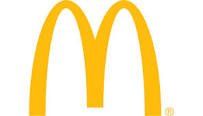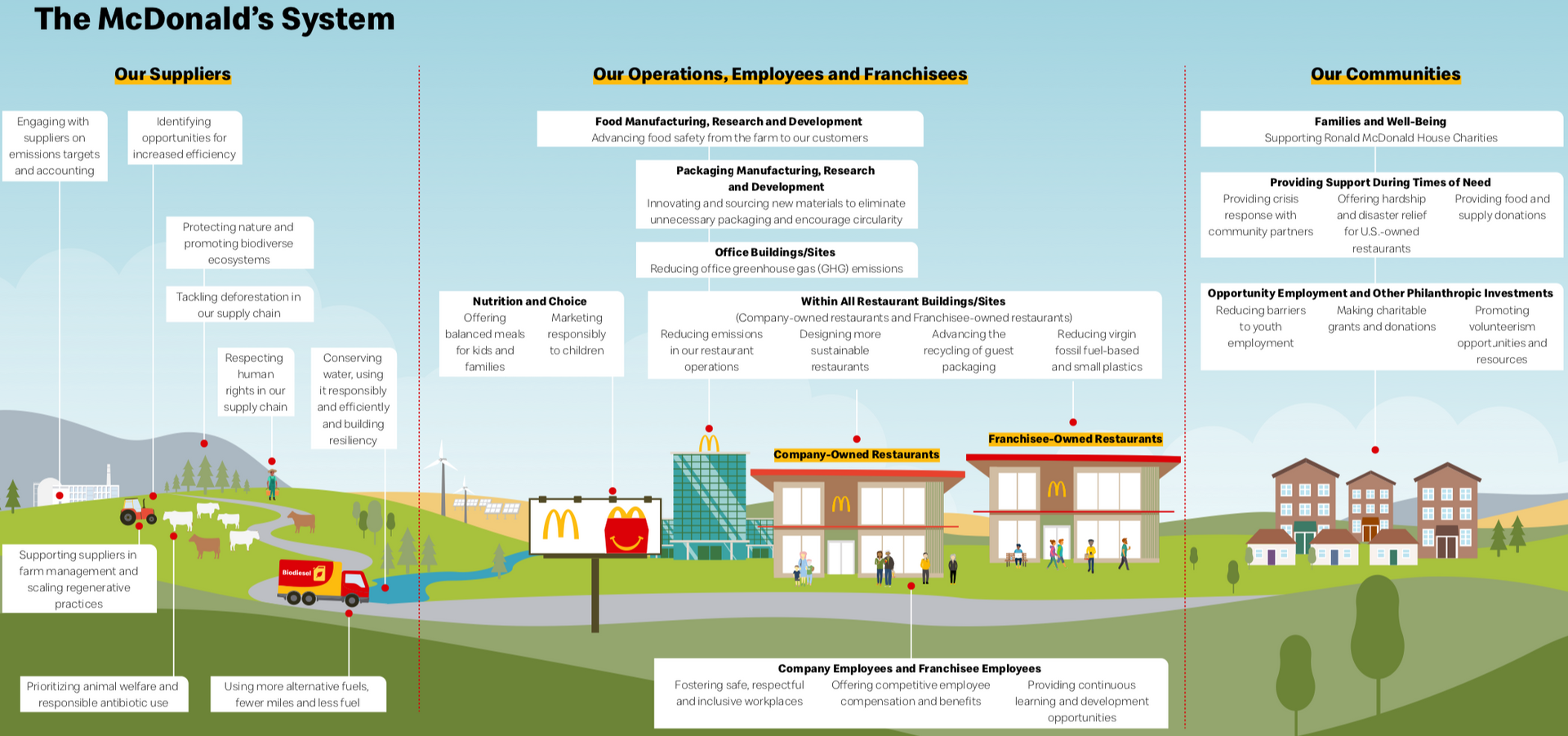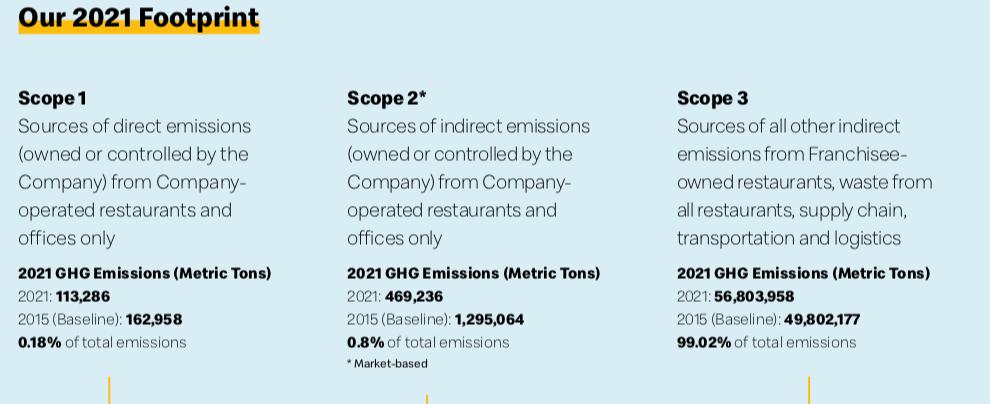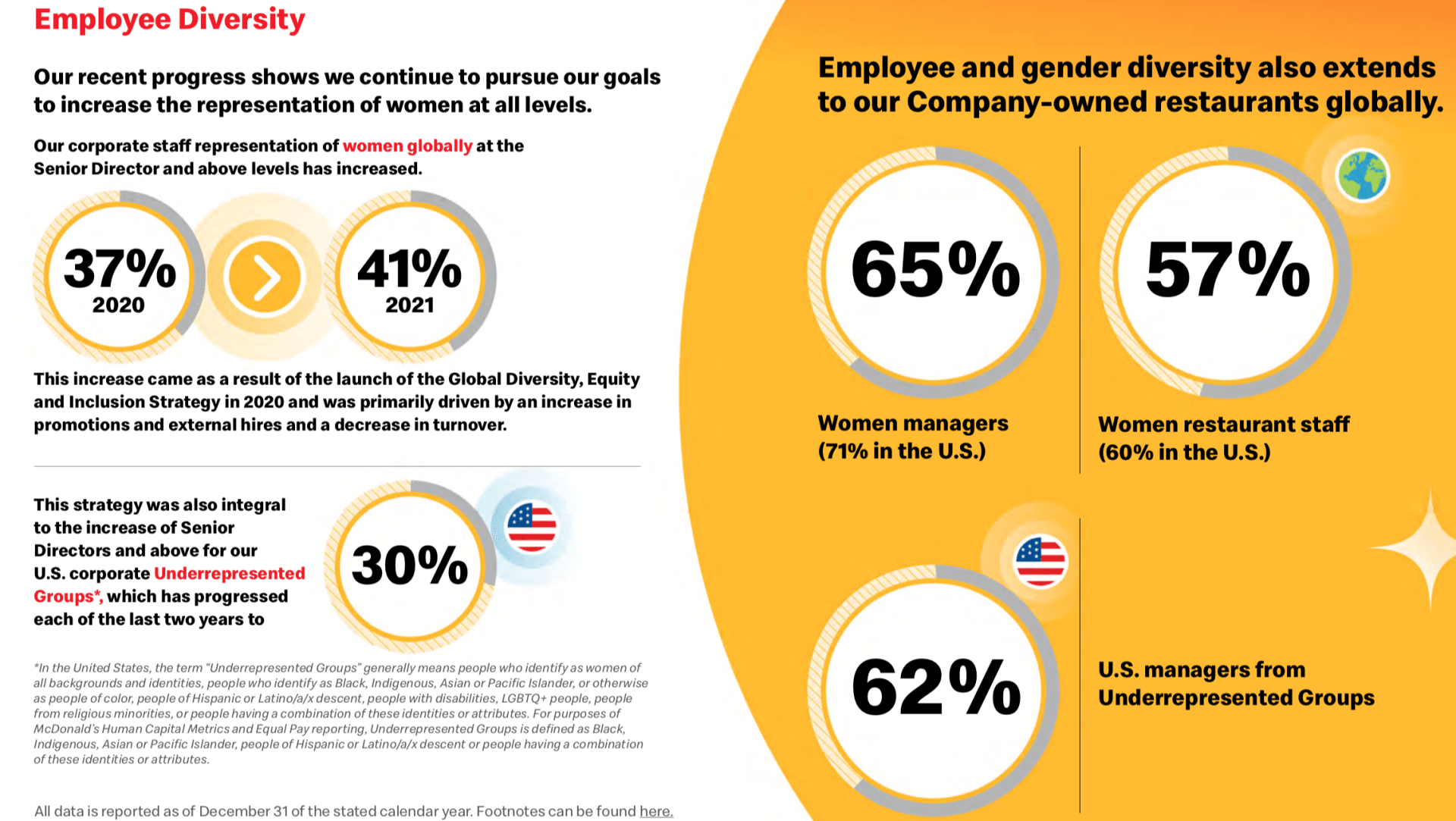CEF Lead Executives
-
JENNY MCOLLOCH
Chief Sustainability Officer, McDonald’s Corporation
As part of McDonald’s Global Impact leadership, Jenny leads the Sustainability & ESG team, which designs and manages McDonald’s cross-cutting environmental, social and community impact strategies, including overseeing corporate giving and volunteerism. Partnering with groups within and beyond McDonald’s, Jenny’s team coordinates impact initiatives and public commitments to drive meaningful, industry-wide change across the value chain – from supply chain through to the restaurant, customer and community experience. Together with IR and other partners, her team manages McDonald’s environmental, social and governance (ESG) progress tracking and reporting for long-term value creation. She previously held roles with Nestlé Waters N.A and as Education Director for Salish Sea Expeditions. Jenny earned her BS/MS in Earth Systems from Stanford University and her MBA from the Yale School of Management. She serves on the First Movers Advisory Board for the Aspen Institute’s Business & Society Program
-
VICTORIA ZIMMERMAN
Global Impact Director, ESG & Sustainability Strategy Alignment
Victoria has led many teams at McDonald’s as a cross functional leader and a problem solver. She drives positive impact by filling the gaps between growers, producers, marketers, and consumers. In Global Impact she tackles challenges across sustainability from Climate to our Community by catalyzing action and collaborating in the white spaces. She brings a unique viewpoint given her experiences across the value chain and enjoys bringing disparate parties together to solve problems. Outside of McDonald’s Victoria supports the UN’s Humanitarian group GHAEA to bring business leaders together to accelerate progress towards SDG-17. When she’s not working, she enjoys yoga, hiking, golfing with her husband and shaping local policy as a newly elected official.
-
ELAINE STRUNK
Director, Global Sustainability
Elaine Strunk is the Director of Global Sustainability (Restaurant and Non-food) at McDonald’s. Prior to this role, Elaine served as a Fellow for the Food + Future coLAB, a collaboration between Target + IDEO + the MIT Media Lab that pushes the edges of technology, business, and design to create new, impactful ventures in urban farming, supply chain & food transparency. Prior to this role, Elaine served as Sustainability Engagement Manager for Harvard University, where she worked closely with the community (students, staff, faculty, and alumni) to foster a sustainable culture at the University.
-
IAN OLSON
Sr. Director, North America Sustainability
Ian Olson is the Senior Director of North America Sustainability for McDonald's Corporation. In this position, Ian is responsible for leading the advancement of environmental and sustainable supply strategies and initiatives for McDonald’s North America business. Prior to his current role, Ian joined McDonald’s USA in 2012 as Director of Sustainability where he developed, led and coordinated initiatives focused on energy, recycling/packaging, water and sustainability communications. Prior to joining McDonald’s, Ian was the Director of Sustainability for Darden Restaurants, holder of such well-known brands as Olive Garden, Longhorn Steakhouse and The Capital Grille. In addition, Ian has held the position of Global Manager and established Ford Motor Company’s Supply Chain Sustainability office.
-
SIMONE GOURGUECHON
Director, Global Sustainability & ESG Strategy
Simone works in global sustainability/CSR strategy at McDonald’s across climate, packaging & recycling, beef sustainability, Happy Meal nutrition and workforce training and development for youth. Prior to McDonald’s, Simone was a strategy consultant to various sustainability and social impact projects with Global Impact in Washington, D.C., The Alford Group in Chicago and with the United Nations (UNDP/UNORC) in Banda Aceh, Indonesia as part of the reconstruction following the 2004 Boxing Day tsunami. She holds a M.S. in International Public Service from DePaul University in Chicago and a B.A. in International Relations and Diplomacy from Schiller University, Madrid, Spain. Originally from Chicago, she lives in the Albany Park neighborhood with her husband Ross and their dog Sparks.
-
KIM YAMAN
Director, Global Supply Chain Finance & Risk Management
Kim Yaman, is a strategic thought leader, experienced at providing financial and risk management expertise for McDonald’s global supply chain, influencing over $40 billion in annual spend. She is passionate about continuous learning and developing future leaders within the organization. She brings experience in global and market roles, including broad-based experience with several functions – Supply Chain & Sustainability, Investor Relations, Accounting & Finance, Consumer Insights, Operations, Learning & Development and external audit.
Sustainability Goals
Sustainability Goals
Ongoing Goals
- Achieve 100% of the following 2020 responsible-sourcing goals for its priority products (beef, coffee, soy for chicken feed, palm oil, fiber, and fish)
- Source a portion of our beef from suppliers participating in sustainability programs aligned with Global Roundtable for Sustainable Beef (GRSB) principles and criteria, and that meet McDonald’s requirements for each applicable market
- In regions with identified risks relating to the conservation of forests, verify that the beef sourced from those regions comes from farms where primary forests and high conservation value lands are preserved
- Source soy for chicken feed that does not contribute to deforestation
- Purchase 100% sustainable certified soy
- Source wild-caught fish purchased for use in McDonald’s restaurants from verified sustainable sources
- Sustainably source 100% of coffee
- 100% of the palm oil used in McDonald’s restaurants and as ingredients in McDonald’s products will support sustainable production
- Eliminate deforestation in supply chains for our beef, chicken (including soy in feed), palm oil, coffee and the fiber used in guest packaging
2025 Goals
- Source 100% of guest packaging from renewable, recycled or certified sources (sourced approximately 80% as of 2021)
- Source 100% of Happy Meal toys worldwide out of recycled, renewable, or certified materials
- Recycle guest packaging in 100% of McDonald’s restaurants (achieved 25% of its restaurants in its 30 largest markets as of 2021).
- Committed to boosting US spending to increase diversity among its suppliers and service providers from 23% to 25%
- Increase the percentage of women (from 37% to 45%) and historically underrepresented groups (from 29% to 35%) in leadership roles
2027 Goals
- Eliminate the use of “Highest Priority Critically Important Antibiotics” (HPCIA) as defined by the World Health Organization (WHO) from all chicken served
2030 Goals
- Partner with Franchisees to reduce GHG emissions related to McDonald’s restaurants and offices by 36% (2015 baseline, emissions reduced by 8.5% as of 2021)
- Reduce emissions intensity (per metric ton of food and packaging) across the supply chain (2015 baseline) (supply chain emissions intensity reduced by 5.9% as of 2021)
- Eliminate deforestation from the global supply chain
- Achieve gender parity in leadership roles and will incorporate its diversity, equity, and inclusion performance into compensation for its Executive Vice Presidents
2050 Goals
- Achieve net-zero emissions across its global operations
Past Goals Achieved
- 100% of fiber-based guest packaging will come from recycled or certified sources where no deforestation occurs (sourced 99.6% of all its paper food packaging from recycled or certified sources in 2020)
Latest Sustainability Reporting
Highlights
- In 2022, added two large-scale U.S. virtual power purchase agreements to contribute more renewable energy to the grid.
- In 2022, sourced 81% of primary guest packaging from renewable, recycled or certified sources, and 97.2% of primary fiber-based guest packaging materials were from recycled or certified sources.
- More than 85% of restaurants in markets with advanced infrastructure offered guests the opportunity to recycle packaging items.
- 98.5% of beef, 100% of palm oil, and 100% of soy sourced for chicken feed supported deforestation-free supply chains.
- 100% of eggs were cage free in Australia, France, and Germany; 88% were cage-free in the U.S.; and 85% in Canada.
- By the end of 2022, made significant progress across all five Global Happy Meal Goals to encourage healthier eating across 20 major markets.
- 2022 pay gap analysis showed that women globally in company-owned and operated markets are paid $0.9991 for every $1 for men (and in Q1 2023 the company closed the identified gaps). It also showed there was no base pay gap disfavoring underrepresented groups in the U.S.
- At the end of 2022, 43% of leadership roles globally were held by women and 28% in the U.S. were held by individuals of underrepresented groups.
- U.S. system-wide spend with diverse-owned suppliers was 25.0% at the end of 2022, reaching 25% goal for second year.
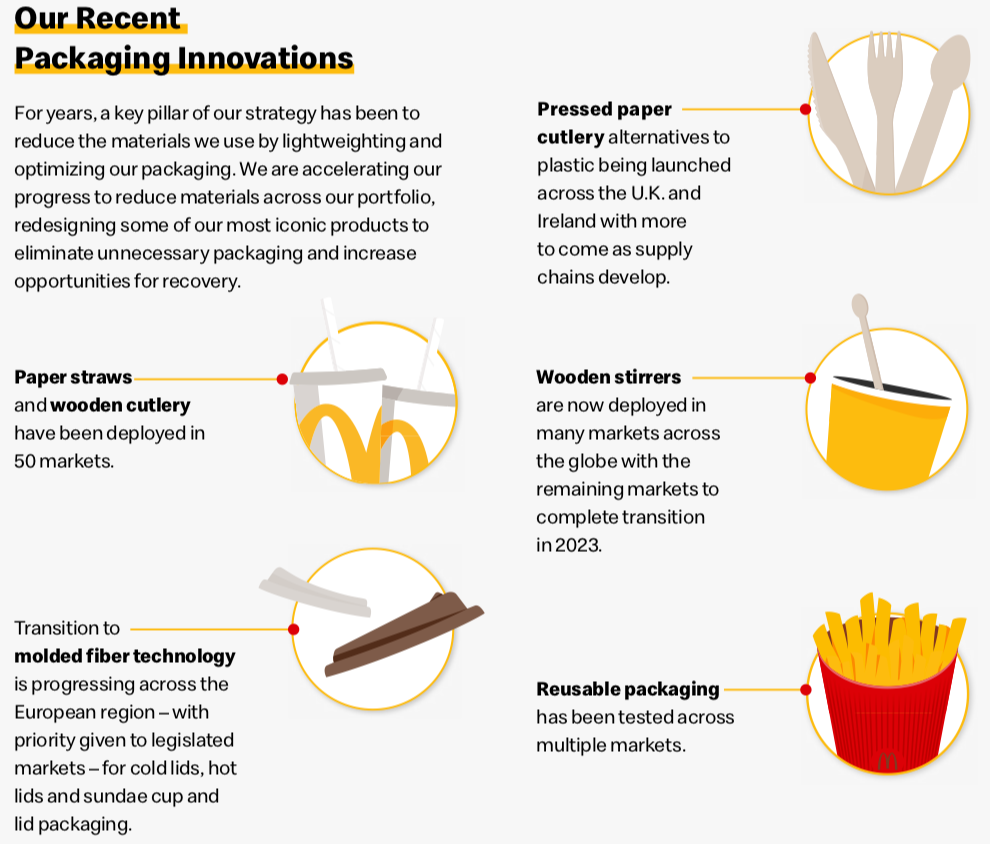
Highlights
- Women held 41% of leadership roles globally at the end of 2021, up from 37% in 2020.
- Individuals from underrepresented groups held 30% of US leadership roles at the end of 2021, with a goal of 35% by 2025.
- Reached its 2025 goal of increasing US spending with diverse-owned suppliers to 25% by the end of 2021.
- Launched a Franchisee recruitment initiative to help increase diversity, including underrepresented groups, committing $250 million over 5 years.
Recent News
2022
McDonald’s and all five members of its North American Logistic Council have signed agreements with Enel North America to purchase renewable energy and the associated renewable energy certificates (RECs) from Enel Green Power’s Blue Jay solar project in Texas. This aggregated purchase will mean the electricity load of McDonald’s USA’s entire logistics supply chain for all its U.S. restaurants is expected to be 100% supported by renewable energy. Once Blue Jay is fully operational in 2023, the combined electricity purchase is expected to be over 470,000 MWh annually. (Dec 2022)
2021
Transparent 2021: Annual ReSource: Plastic Progress Report (World Wildlife Fund) —Outlines progress made by the eight companies in the ReSource: Plastic program—including CEF members Kimberly-Clark, McDonald’s, and Procter & Gamble—in tackling plastic waste. From 2018 to 2020, the five Principal program members—including McDonald’s and Procter & Gamble—increased their use of recycled content from 7.8% to 9.6% (124,000 metric tons). The report outlines opportunities and recommendations for corporate collective action and investment, and calls for a global treaty on plastic pollution. (Dec 2021)
Committed to investing $250 million in the U.S. over five years to give franchisee candidates financing alternatives for upfront entry costs and reduce socioeconomic barriers. The investment is part of a new recruitment initiative to increase the number of McDonald’s franchisees from all backgrounds, including historically underrepresented groups, in the U.S. and all international operated markets. (Dec 2021)
Composting Consortium — A new consortium to pilot composting solutions and create an infrastructure and technologies roadmap that increases the recovery of compostable food scraps and food packaging. Closed Loop Partners’ Center for the Circular Economy is the managing partner. CEF member
PepsiCo and the NextGen Consortium (co-founded by CEF member
McDonald’s) are founding partners. Advisory partners include CEF member
Google and the Sustainable Packaging Coalition (which includes CEF members
3M, Amazon, BASF, Dow, ExxonMobil, HP Inc., Kimberly-Clark, McDonald’s, Microsoft, PepsiCo, Procter & Gamble, Sealed Air, Unilever,
and Waste Management). (Nov 2021)
MORE »
27 COMPANIES’ SOY COMMITMENT —
27 UK companies representing nearly 60% of all UK soy bought annually—including CEF member
McDonald’s—signed a new
UK Soy Manifesto, which includes a commitment to ensure by 2025 that physical soy shipments to the U.K. aren't linked to deforestation or grown in areas where native vegetation was converted into farmland. (Nov 2021)
MORE »
Reached gender pay equity for US corporate store employees, with plans to close the gap at its corporate offices and international markets next year. (Oct 2021)
MORE »
MCDONALD’S / STARBUCKS —
The companies, founding partners of the
NextGen Consortium, committed an
additional $10 million for the consortium to continue
developing circular, commercially viable packaging solutions
for the
food-service industry. (Oct 2021)
MORE »
Committed to
achieving net-zero emissions across its global operations by 2050,
with plans to
increase its existing 2030 science-based targets for Scopes 1-3 and set a long-term reduction target to reach net zero. It also
joined the UN Race to Zero
and the Business Ambition for 1.5°C campaign.
(Oct 2021)
MORE »
Pledged to
make all Happy Meal toys worldwide out of recycled, renewable, or certified materials by the end of 2025, which is estimated to result in a 90% reduction of virgin fossil fuel-based plastic in the toys (2018 baseline). (Sept 2021)
MORE »
Announced
99.6% of all its paper food packaging in restaurants was sourced from recycled or certified sources by the end of 2020 (baseline 92% in 2019). (Aug 2021)
MORE »
MORE 2 »
Food Emissions 50, a new effort coordinated by
Ceres, was
launched to accelerate a net-zero transition in the food and agriculture sector. It
brings together global institutional investors to engage 50 of the highest-emitting North American public food companies—including
JBS USA, McDonald’s, and
Walmart—to improve emissions disclosures, set emission-reductions targets, and implement climate transition plans. (Aug 2021)
MORE »
Announced
6 of its UK locations will trial reusable, returnable coffee cups, as part of its global partnership with
TerraCycle’s
Loop collection model. Circular design company
Circular&Co made the cups from previous single-use coffee cups. (July 2021)
MORE »
Committed, as part of its
new Mutual Commitment to Diversity, Equity & Inclusion, to boosting U.S. spending to increase diversity among its suppliers and service providers from 23% to 25% by 2025. Over 20 of its largest suppliers—including
Cargill and
Tyson Foods— have signed the commitment. The company also expects to increase investments in diverse-owned U.S. media companies from 4% to 10% by 2024. (July 2021)
MORE »
Global Roundtable for Sustainable Beef
— The coalition of global beef producers released its new sustainability roadmap with a commitment to reduce the “net global warming impact” of each unit of beef produced by 30% by 2030. Members, which include
McDonald's, ADM, JBS, Rabobank, and
Cargill, also agreed to improve animal welfare; ensure the value chain is a net-positive contributor to nature; and improve natural carbon stores in land and soil, which could sequester up to 216 million tons of carbon annually by 2030. (July 2021)
MORE »
Care Economy Business Council — A new coalition of over 200 businesses advocating for comprehensive US care infrastructure and workplace policies to help people, particularly women, reenter the workforce. Led by advocacy organization Time’s Up, companies engaged include JPMorgan Chase and McDonald’s. (May 2021)
Over 80 companies—with combined annual revenue of $1.5 trillion, $341 billion in assets, and over 3 million U.S. employees—called on federal lawmakers to support ambitious climate policy action to address the climate crisis and advance environmental justice
as part of the Ceres-led “LEAD on Climate” advocacy day. CEF members participating included Amazon, CBRE, Dell Technologies, Dow, HP Inc., McDonald’s, Microsoft, PepsiCo, Samsung Electronics America, Siemens,
and Unilever. (May 2021)
MORE »
Second Chance Business Coalition — A cross-sector coalition of 29 large US employers committed to expanding second chance hiring and advancement practices for people with criminal records. Co-chaired by JPMorgan Chase CEO Jamie Dimon and Eaton CEO Craig Arnold, members include Bank of America, Cisco, GM, JPMorgan & Chase, Mastercard, McDonald’s, Microsoft, P&G, PepsiCo, and Visa. (May 2021)
Members of the Corporate Electric Vehicle Alliance (CEVA) and the BICEP Network sent letters (CEVA letter and the BICEP letter) calling for the Biden administration to adopt vehicle standards aligned with climate science and consistent with a pathway to 100% zero-emission vehicle sales by 2035. The two Ceres-led networks represent over 80 companies with combined annual revenue of $1.3 trillion and include Amazon, CBRE, Kaiser Permanente, McDonald’s, Microsoft, Siemens, Tiffany & Co., Unilever, and VF Corporation. (April 2021)
More than 300 businesses representing over $3 trillion in annual revenue and employing nearly 6 million US workers signed an open letter calling upon President Biden to adopt a GHG emissions reduction target of at least 50% by 2030 (2005 baseline). Organized by the We Mean Business coalition and Ceres, signatories of the letter included: Apple, Dell Technologies, Facebook, Google, Hewlett Packard Enterprise, HP, Johnson & Johnson, Mastercard, McDonald’s, Microsoft, Siemens, Trane Technologies, Unilever, and VF Corporation. (April 2021)
Announced plans to mandate anti-harassment, discrimination, and violence training across its 39,000 company-owned and franchise restaurants, encompassing 2 million workers in over 100 countries, effective January 2022. The mandate is part of its new Global Brand Standards designed to further a culture of physical and psychological safety for employees and customers. (April 2021)
Plant-based food company Beyond Meat announced global distribution agreements with McDonald’s and Yum! Brands, the parent company of KFC, Taco Bell, and Pizza Hut. (March 2021)
The Renewable Energy Buyers Alliance updated its “Deal Tracker,” highlighting the largest corporate renewable energy purchasers in 2020. The top 10 included the following (February 2021):
- Amazon (3.163 GW)
- Google (1.040 GW)
- Verizon (.840 GW)
- McDonald’s (.750 GW)
- Facebook (.725 GW)
- General Motors (.610 GW)
- Nucor (.325 GW)
- Evraz North America (.300 GW)
- Lowe’s (.250 GW)
- Nestlé (.250 GW)
A major new coalition, “America is All In,” launched to mobilize bold climate ambitions nationally and uphold the federal government’s commitment to climate action—specifically to cut U.S. emissions in half or more by 2030 and reach net-zero by 2050. Co-led by UN Special Climate Envoy Michael Bloomberg, the coalition effectively merges We Are Still In and America’s Pledge and is the most expansive effort ever assembled to support climate action in the U.S., involving U.S. businesses, cities, states, tribal nations, schools, and faith groups, health care organizations, and cultural institutions. Large companies involved include: 3M, Adobe, Amazon, Apple, ADM, Autodesk, BASF, Best Buy, Cargill, Carrier Corporation, The Clorox Company, Coca-Cola, Danone N.A., Dell Technologies, Dow Inc., DSM N.A., DuPont, eBay, Edison International, Facebook, Gap, General Mills, Google, Hewlett Packard Enterprise, HP, Inc., IKEA U.S., Johnson & Johnson, Johnson Controls, Kellogg Company, LafargeHolcim, Levi Strauss & Co., L’Oréal, Mars Incorporated, McDonald’s, Microsoft, Mondelez International, National Grid, Nestle, NIKE, Novozymes, PG&E Corporation, PepsiCo, Salesforce, Siemens, Sony Corporation of America, Starbucks, Steelcase, Target, Tiffany & Co., Trane Technologies, Verizon, VF Corporation, Walmart, and Waste Management. (February 2021)
McDonald’s committed to achieving gender parity in leadership roles (Senior Director or above) by the end of 2030 and will incorporate its diversity, equity, and inclusion performance into compensation for its Executive Vice Presidents. It announced interim 2025 goals to increase the percentage of women (from 37% to 45%) and historically underrepresented groups (from 29% to 35%) in leadership roles. (February 2021)
McDonald’s opened the world’s first net-zero fast food restaurant at the Walt Disney World Resort in Florida. (February 2021)
Nebraska Soil Carbon Project
— A Nature Conservancy-led pilot project to
sequester and store 150,000 metric tons of CO2e by paying Nebraska farmers a fixed per-acre price to implement sustainable farming practices
(no tillage, diversified crop rotations, and cover cropping) across 100,000 acres over 5 years. Companies involved include
Cargill, Target
and McDonald's. (January 2021)
MORE »
The Renewable Energy Buyers Association (REBA) issued a statement signed by 36 companies — including Amazon, Clorox, Facebook, GM, Google, Johnson & Johnson, McDonald’s, Microsoft, PepsiCo, and Unilever — proposing federal policy priorities to help accelerate the adoption of a customer-centric clean energy transition. Priorities include: 1) expanding and enhancing wholesale energy markets; 2) harmonizing clean-energy procurement and standards; 3) supporting the innovation and commercialization of energy R&D. (January 2021)
Partners of the Sustainable Coffee Challenge — which include McDonalds, Starbucks, Walmart, and over 100 other companies and nonprofits — pledged to reduce their collective CO2 emissions by at least 1.5 gigatons by 2050. In addition, partners of the consortium pledged to protect 1.2 million acres of forest over the next five years and implement labor-related initiatives to protect and benefit smallholder farmers. (January 2021)
2020
McDonald’s has joined forces with Cargill and the Walmart Foundation to invest more than $6 million in a WWF-led initiative that aims to scale up sustainable cattle grazing in the Northern Great Plains. (September 2020)
McDonald’s has
partnered with TerraCycle’s Loop platform to
pilot a reusable cup program in the UK that gives customers the option to choose a hot beverage cup that they can return to be safely cleaned and reused again. The pilot
will begin in 2021
across select McDonald's restaurants in the UK. (September 2020)
MORE »
McDonald’s partnered with EV charging company InstaVolt to install EV rapid charging points at new and existing Drive Thru restaurants in the UK. (July 2020)
McDonald’s UK and Ireland will stop including toys made from non-recycled or non-renewable forms of hard plastic in its Happy Meal by 2021. As a result, the company expects to eliminate over 3,000 metric tons of non-sustainable plastic use from the business. (March 2020)
Ranked #9 (.380 GW) on the Renewable Energy Buyers Alliance “Deal Tracker,” which highlights thelargest corporate renewable energy purchasers in 2019. (Feb 2020)
2019
Ford Motor Company has partnered with McDonald’s to transform coffee bean waste into a durable material that can be used to reinforce certain vehicle parts, such as headlamp housing. The vehicle components produced with this material are expected to be about 20% lighter and require up to 25% less energy during the molding process. (Dec 2019)
McDonald’s USA is now sourcing 100% sustainable ground and whole bean coffee for its U.S. restaurants, achieving its 2020 goal a year ahead of schedule. (Nov 2019)
McDonald’s has signed two virtual power purchase agreements to source a combined 380 MW of renewable energy from a wind power project located in Coke County, Texas and a solar project located in Texas. The power generated from these projects are expected to prevent over 700,000 metric tons of carbon emissions annually. (Nov 2019)
Became principal member of World Wildlife Fund’s ReSource: Plastic, a platform aimed at helping companies to maximize, measure, and multiply their impact on solving the plastic pollution crisis. (May 2019)
Joined a group of 18 companies participating in the Plastic Leak Project, an initiative to “develop robust metrics to locate, measure and map plastic and microplastic pollution across the value chain and define effective actions to fix the problem of plastic leakage into the environment.” The initiative was co-founded by sustainability consulting firm Quantis and ecodesign center EA. (March 2019)
One of 120 companies — out of more than 5,500 companies analyzed — recognized on CDP’s Supplier Engagement leaderboard (in “Global Supply Chain Report 2019”) for their work with suppliers to reduce emissions and lower environmental risks in the supply chain. (Feb 2019).
Joined a group of coffee chains in the UK — including Caffè Nero, Greggs, and Pret A Manger — to create a nationwide cup recycling scheme aimed at recycling 500 million takeaway coffee cups by 2020. (Jan 2019) MORE »
